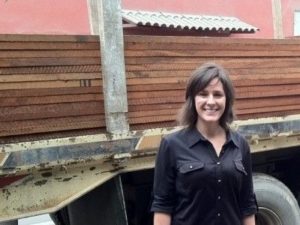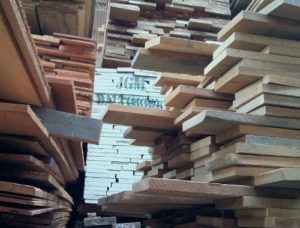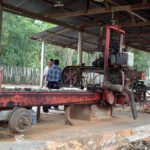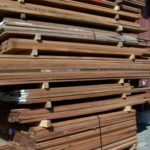
We have mentioned several times that we often visit our lumber mills around the world to ensure quality and legality. On a recent trip to Peru, our exotic buyer, Caroline McIlvain got a look at some beautiful Genuine Mahogany. She also came face to face with a pack of lumber that we bought but was never exported. This was some time ago so all the details are a little fuzzy, but I thought it was a great example of what good, long standing relationships with sawmills can do for you, and how the Lacey Act could effect a specific pack of lumber.
This Mahogany was harvested, sawn, and air dried. We purchased a container from this harvest and waited for the lumber to hit the water en-route to the port of Baltimore. The lumber never left South America. As far as we can tell a local law was changed that prevented the export of lumber from this particular land concession. While it would be too severe to say it was illegal lumber, that regulation change added enough uncertainty that our supplier held back that shipment knowing that it might cause problems for J. Gibson McIlvain with the Lacey Act.

If in fact this lumber were exported, we would have been in violation of the Lacey Act had we tried to transport it or sell it because of a violation of local law. Keep in mind that our supplier could have shipped it and left it to us to know that it needs to be rejected. Meanwhile we would pay all kinds of fees for storage at the port and any seizure charges that would eventually be levied.
By holding back the lumber and shipping alternate packs we were saved a lot of hassle and our customers were protected against a Lacey violation. So now this lumber sits in the back of a shed clearly marked to be shipped to us. I’m not sure how long it will sit there until we or someone else can use it but we are eternally grateful to a vigilant supplier.
This is a great example of how a partnership with your suppliers can help to ensure that our forests are protected and everyone in the supply chain is in compliance with the laws. Moreover, this is just another example of how we choose not to purchase more lumber than we actually purchase to ensure the best quality and legality for all of our customers.
Learn more about the lumber industry:









So now this lumber sits in the back of a shed clearly marked to be shipped to us.
I think you mean to say:
So now this lumber sits in the back of a shed clearly marked NOT to be shipped to us.
At least contexturally that is how I would interpret the sentence.
Good article and example which the marketplace needs more of.
Best-
Actually that is how I meant to word it but I can see how that would be confusing and I take your point. The main gist being that we bought this lumber and it was prepared for shipment so far as to even mark our name on it. Our trusted supplier fortunately caught it and didn’t ship so now this pack sits in limbo still labelled with our company name.
What is the name of the company and how long will local law allow them to hold it before auction begins?
9 times out of 10 material like this gets filtered into the local market and is never exported.